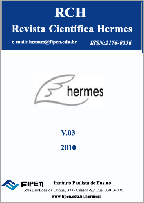Clean Technology in Micro And Small Companies: empiric evidence on the impact of Environmental Regulations
DOI:
https://doi.org/10.21710/rch.v3i0.33Keywords:
clean production, small business, environment laws, environment regulationsAbstract
This article aims to comprehend the forces which regulate the interaction between companiesand environment, mainly the ones obliged by environmental laws. Our main proposition is toRevista CientÃfica Hermes 3: 24-36, 2010learn that environmental regulations can show the gaps in the processes of environmentmanagement, suggest improvements, increase awareness on environment problems, reduceexpenses for companies as well as become an unnecessary cost to the company andconsequently jeopardize the competitiveness or impose barriers to clean technologiesinnovations for the productive process. This paper uses an exploratory study in micro andsmall businesses and the results display that it is not possible yet to confirm thatenvironmental laws can change the productive processes to reduce pollution and that thecompanies which introduced changes according to the regulations had some level of supportfrom universities or research institutions.References
Backer, P. 1995. Gestão Ambiental: A administração verde. Qualitymark, Rio de Janeiro.
Baldwin, J. & Hanel, P. 2003. Innovation and knowledge creation in an open economy: canadian industry and international implications. Cambridge University Press, New York.
Barrett, S. 1994. Strategic environmental policy and international trade. Journal of Public Economics 54(3): 325-38.
Jaffe, A. & Palmer K. 1997. Environmental regulation and innovation: study. The Review of Economics and Statistics 59(4): 610-619, 1997.
Lanjouw, J.O. & Mody, A. 1995. Innovation and the international diffusion of environmentally responsive technology. Research Policy 25: 549-571.
Neder, R.T. 1999. Existe política ambiental na grande indústria no Brasil? In: Sorrentino, M.; Trajber, R. & Braga, T. (orgs.). Cadernos do III Fórum de Educação Ambiental. Gaia, São Paulo.
Oates, W.E.; Palmer, K. & Portney, P.R. 1993. Environmental regulation and international competitiveness: thinking about the Porter hypothesis. Resources for the Future, Washington.
OCDE. 1997. Données sur l’environnement. OCDE, Paris.
Porter, M.E. & Van-Der-Linde, C. 1995. Toward a new conception of the environment-competitiveness relationship. Journal of Economic Perspectives 9: 97-118.
Rennings, K;. Ziegler, A. & Zwick, T. 2001. Employment changes in environmentally innovative firms. ZEW Discussion Paper No. 01-46, Mannheim.
Rosegger, G. 1996. The economics of production & innovation: an industrial perspective. Pergamon Press, Oxford.
Shrisvastava, P. 1995. Greening business: Profiting the corporation and the environment. Van Nostrand Reinhold, New York.
Simpson, R.D. & Bradford, R.L. 1996. Taxing variable cost: environmental regulation as industrial policy. Journal of Environmental Economics and Management 30: 282-300.
Downloads
Published
How to Cite
Issue
Section
License
Copyright (c) 2010 Revista CientÃfica Hermes - FIPEN

This work is licensed under a Creative Commons Attribution 4.0 International License.






